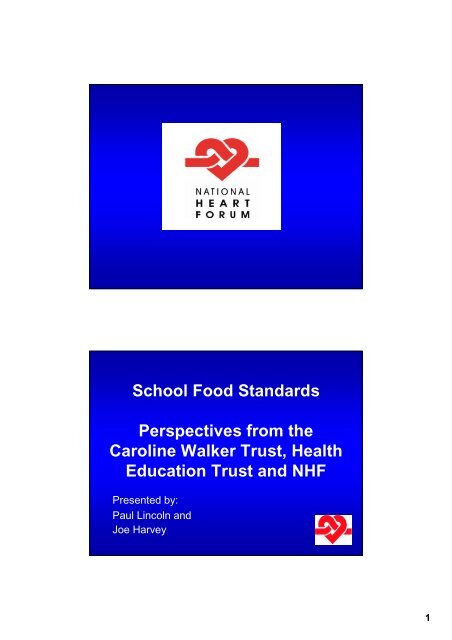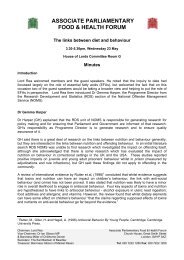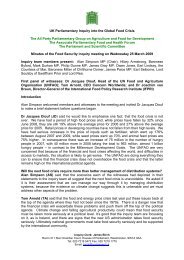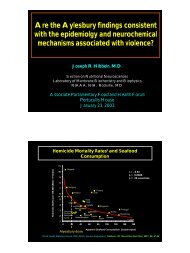School Food Standards Perspectives from the Caroline Walker Trust ...
School Food Standards Perspectives from the Caroline Walker Trust ...
School Food Standards Perspectives from the Caroline Walker Trust ...
You also want an ePaper? Increase the reach of your titles
YUMPU automatically turns print PDFs into web optimized ePapers that Google loves.
<strong>School</strong> <strong>Food</strong> <strong>Standards</strong><br />
<strong>Perspectives</strong> <strong>from</strong> <strong>the</strong><br />
<strong>Caroline</strong> <strong>Walker</strong> <strong>Trust</strong>, Health<br />
Education <strong>Trust</strong> and NHF<br />
Presented by:<br />
Paul Lincoln and<br />
Joe Harvey<br />
1
Purpose<br />
• <strong>School</strong> meal facts and figures<br />
• Historical and policy context<br />
• Why Nutrient based standards?<br />
• CWT/NHF recommendations<br />
• Key Issues<br />
Facts and Figures<br />
• 3.5 million meals each day<br />
• 45% of school children<br />
• England -17% primary , 15% secondary<br />
entitled to free school meals<br />
• 40-69% inactive-1 hour a day<br />
2
Historical Context<br />
• 1994 Education Act<br />
• 1980 Education Act<br />
• 1992 <strong>Caroline</strong> <strong>Walker</strong> <strong>Trust</strong> Guidelines-The gold standard<br />
• 2001 <strong>School</strong> meals delegated to all Secondary <strong>School</strong>s and<br />
Minimum nutritional standards<br />
• 2003 Welsh Assembly –free breakfasts for primary school<br />
children by 2006/school councils 2005<br />
• 2002 Scotland “Hungry for Success”-whole school<br />
approach<br />
• 2005 DH Choosing Health and DFES Raising <strong>the</strong> Standard<br />
3
Why (Compulsory) Nutrient Based<br />
<strong>Standards</strong>?<br />
• FSA/DFES survey 2004-food choices and<br />
inadequacy of food based standards<br />
• Health and health inequalities impact and potential<br />
• Fat, Sugar and Salt<br />
• Vitamin A, riboflavin, folate, zinc, magnesium,<br />
calcium, potassium, iodine, fruit and vegetables<br />
• Attendance, concentration and attainment<br />
• <strong>School</strong> meals delegation<br />
• Monitoring<br />
CWT/NHF Recommendations<br />
<strong>Food</strong> Policy<br />
• Mandatory nutrient based standards<br />
• <strong>School</strong> inspection process<br />
• Standard cost regularly revised<br />
4
CWT/NHF recommendations<br />
Training and support<br />
• <strong>School</strong> meal providers<br />
• Governors and Head teachers<br />
• Teachers and support staff<br />
• Resources e.g. CD-ROM menu planning<br />
and curriculum<br />
CWT/NHF recommendations<br />
Monitoring<br />
• Nutrient based standards – <strong>the</strong> framework<br />
• Children and young people<br />
• Included in school food contracts<br />
• Annual report – school governing bodies<br />
5
CWT/NHF recommendations<br />
“Whole school approach : school nutrition<br />
policy”<br />
6
Key Issues<br />
• Audit and selective upgrade of<br />
equipment/facilities in school kitchens<br />
• Training and accreditation for catering staff<br />
• Review school meal regulations to include<br />
nutrient based standards<br />
• Review of free school meal value<br />
• Impact of delegated budgets on small<br />
schools<br />
Key issues continued<br />
• Cooking/food hygiene as core curriculum<br />
• Establish database on schools meals service<br />
and monitor/evaluate interventions<br />
• Fresh unprocessed food-locally supplied<br />
7
NHF Publications<br />
• Young@Heart<br />
Policy Framework<br />
9












